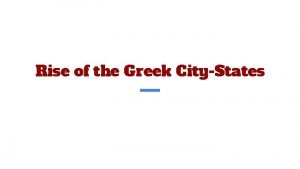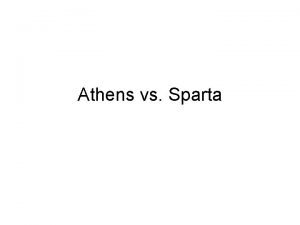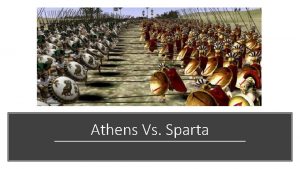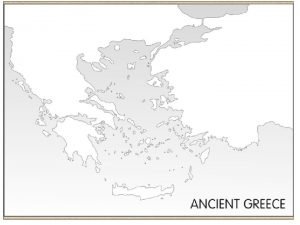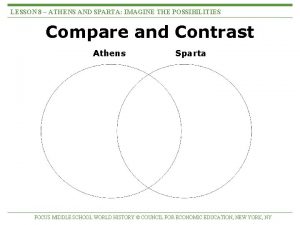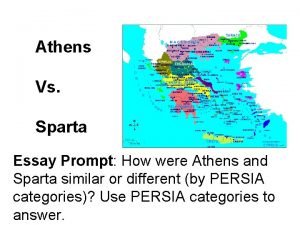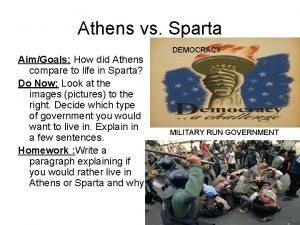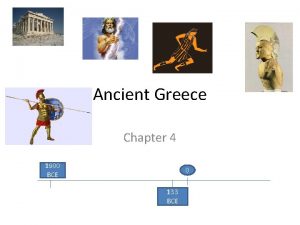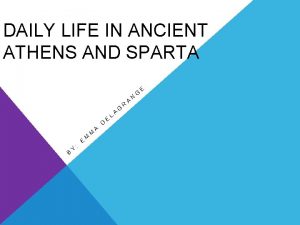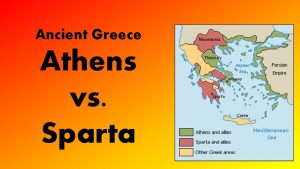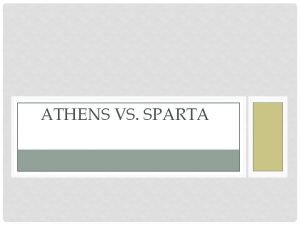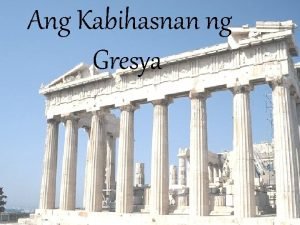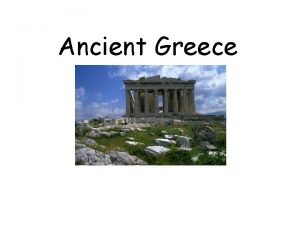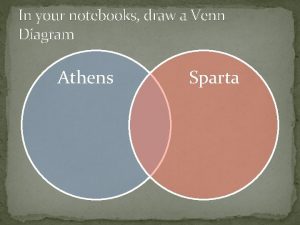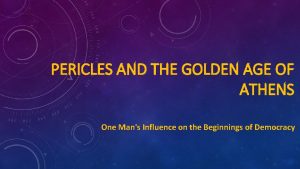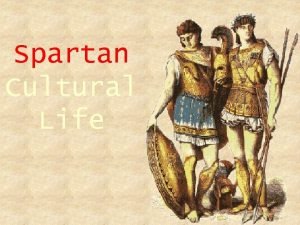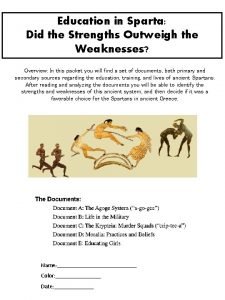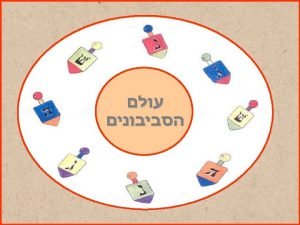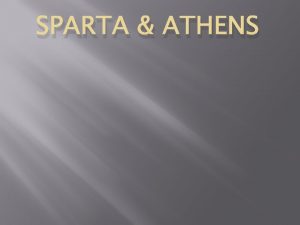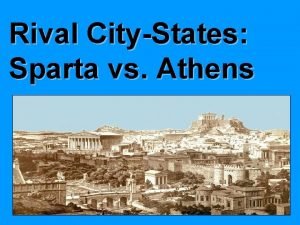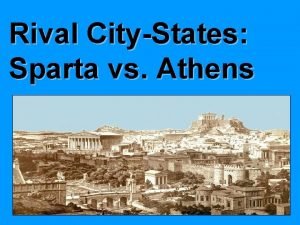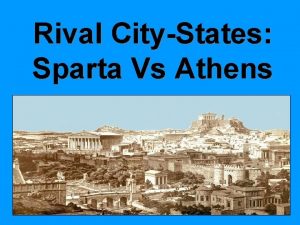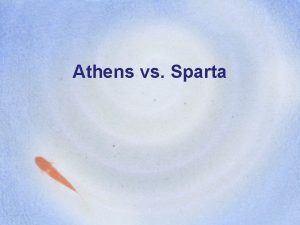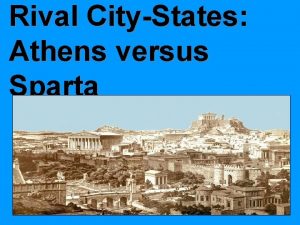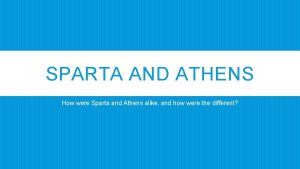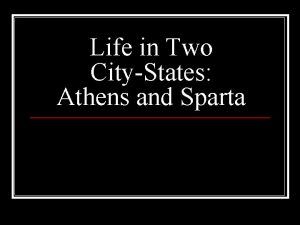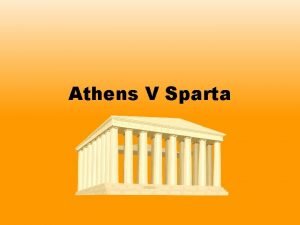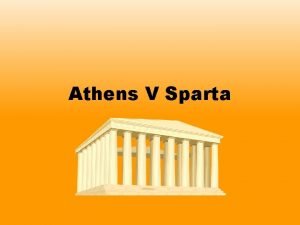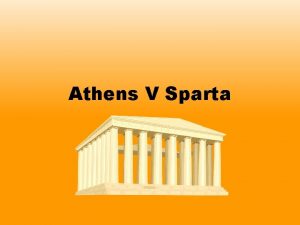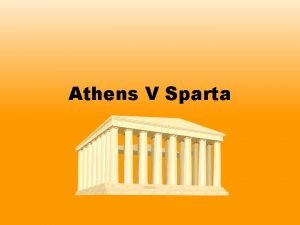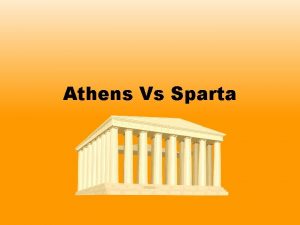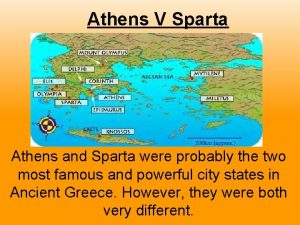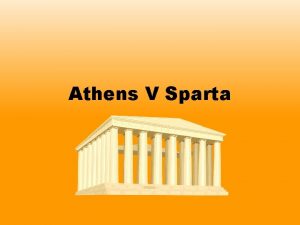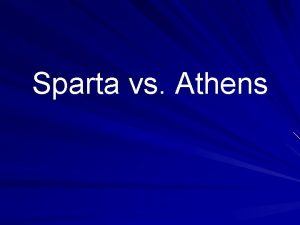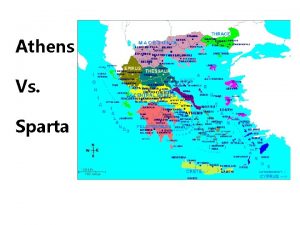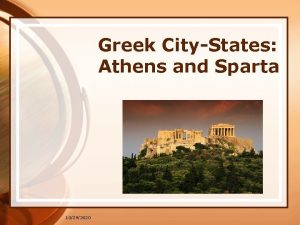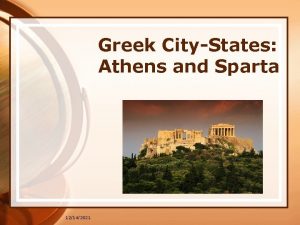Greek CityStates Athens and Sparta 6152021 Greek CityStates
































- Slides: 32

Greek City-States: Athens and Sparta 6/15/2021

Greek City-States • Similarities • Covered small areas of land • Athens (smaller than Rhode Island) • Sparta (smaller than Connecticut) • Large compared to others • Small populations (most fewer than 10, 000) 2

Sparta • Sparta was an isolated city-state that was culturally and politically different from Athens. • Great military, army feared by other nations. • Fighting Machines! • During the Peloponnesian War Sparta sacked Athens.

Spartan society • 3 social groups • Equals: descended from the invaders, controlled Sparta • Half-citizens: free, paid taxes and served in the army but had no political power, some farmed but others worked in the city as traders or artisans • Helots: slaves, greatly outnumbered the other groups so Spartans used force to control them, in large part this is why Sparta became a military city-state 6/15/2021

• Sparta was an oligarchy: rule by the few! • Sparta was ruled by two kings • Helots outnumbered Spartans 7 to 1! This was the main reason for the strict war-like society… • Breakdown of Spartan Social Structure Perioeci (Perioikoi) Helots

Spartan Government • Two kings led Sparta • 1 king handled military • 1 king took care of domestic matters • A council of Elders • Made up of 28 male citizens over the age of 60 • Proposed laws and served as a criminal court • An assembly • Included all male citizens over 30 • Elected 5 ephors • Made sure the kings stayed within the law • Elected for a 1 year term • Controlled the education of Spartans 6/15/2021

Sparta’s Military Society • Goal was to make every male citizen a part of the military machine • Military worked to expand Sparta and control the helots • A group of officials examined new born babies and those deemed unhealthy were left to die • At 7 boys left home to join the barracks • Mainly military training but they also learned how to read and write • From age 18 -20 they learned specifically about warfare • At 20 they could marry but could not live at home until age 30 • Were available for military service until the age of 60 6/15/2021

Sparta’s Military Society (cont’d) • Spartan women • Received strict physical training • Taught to be devoted to the city-state • Their best value was seen as producing Spartan soldiers • Results of military society: • • 6/15/2021 Strong government Almost unbeatable army No individual freedom Created almost no art or literature and made almost no advances in science

Result of Militarism • Succeeded in holding power over perioeci and helots for 250 years • Suspicious of new ideas and lagged behind other cities in business • Much poorer • Lagged in intellectual development • Exceptional athletes and best protector of Greece 6/15/2021 John 3: 16 9

Athens was the first democracy. • Democracy: type of government where people vote. • Athens was a direct democracy where people vote on everything. However, only citizens could vote • Breakdown of Athenian Social Structure Adult Male Citizens w Women, childre Non-citi

Athenian Society • 3 class groups • Citizens: extended to all those born in Athens, only the men had political rights • Metics: born outside Athens, free and had to pay taxes but had no political rights and could not own land • Slaves: captured in war, together with metics made up more than half of Athenian society 6/15/2021

6/15/2021

Early Athenian Government • After the monarchy ended, an aristocracy took its place • All adult male citizens met in an assembly • Elected generals in time of war • Elected nine archons (rulers with a 1 year term) • First written code created around 621 • Solon (archon in 594 B. C. ) • Outlawed selling people into slavery to pay their debt • Divided citizens into 4 groups based on wealth: wealthiest 2 could hold office 6/15/2021

On its way from a Monarchy to Democracy Athens had several people who made important reforms to develop their government Early Athens was ruled by a king after it became a unified polis about 700 B. C. Later Aristocrats took power as they controlled most of the land. Increased trade led to the development of a merchant class, these merchants became the Tyrants (Tyrants were not necessarily bad) 6/15/2021

Draco’s Law Code • Draco issued an improved code of written laws • Aristocrats could no longer dictate what was legal. • Some of his laws were harsh: e. g. , death for stealing cabbage. • Over time, the term “draconian” has come to mean something cruel and severe. • Positive side—the laws were written down and aristocrats could no langer take advantage 6/15/2021 John 3: 16 15

Solon’s Reforms • Leader of Athens 594 B. C. • Cancelled all debts and freed debtors from slavery • Solon improved economic conditions, promoted trade, fostered industry, and introduced political reforms that moved Athens toward democracy • Ordered fathers to teach sons a trade • Established 2 -house government for political equality 6/15/2021 John 3: 16 16

Radical Reformers • Peistratus (pih*SIHS*truh*tuhs) • divided large estates among landless farmers • extended citizenship to men who did not own land • offered the poor loans and jobs. 6/15/2021 John 3: 16 17

Radical Reformers • Cleisthenes came to power in 508 B. C. • Introduced laws that established democracy • Sought to • • 6/15/2021 End local rivalries Break power of aristocracy Extend guarantees to more citizens Reorganize central government John 3: 16 18

Greek Military • This is a hoplite, a Greek infantry soldier. • Hoplites were middle class freemen who had to pay for their own weapon and shield.

Greek Military: Phalanx • Soldiers get in a tight box. They each have a large shield and a 9 foot long spear. • Was used in the Battle of Marathon in 490 BC. The Athenians defeated the Persians with this tactic.

The Persian Wars • In 546 B. C. , Persia, led by Cyrus II, conquered the Greek city-states in Ionia • Ionians disliked them • Considered them to be barbarians • Ionians revolted against the Persians • Athens and others helped, but Darius and his Persians defeated them • Darius decided to punish the Greeks 6/15/2021 John 3: 16 21

Battle of Marathon 6/15/2021 • Darius sent his fleet directly across the Aegean Sea north of Athens. • The Athenians were outnumbered 20, 000 to 10, 000. • The Persians decided to pack up and attack Athens directly, but at the moment of loading their ships back up, the Athenians attacked. • As the Persian army was standing in knee deep water waiting to board the ships, the Athenians attacked downhill and it was a rout—Persians lost 6, 400 men; Athenians lost 192 John men. 3: 16 22

Salamis • The Persians returned 10 years later and leading the army was Xerxes, son of Darius with 200, 000 soldiers. Off shore supply ships accompanied them. • The Greeks faced the Persians again, this time under Spartan leadership • The Oracle at Delphi, a few years earlier, had said Greece would be shielded by a wooden wall • Athenian general Themistocles believed that meant ships 6/15/2021 John 3: 16 23

Salamis • To challenge the Persians at sea, a delaying action had to be established • The Greek army set up a delaying action on land, led by King Leonidas of Sparta; knowing that a traitor had showed the Persians a way to attack the Greeks and realizing that he would soon be surrounded, Leonidas neverthelsss stayed to face his death. • The Athenians, led by Leonidas, held off the Persians for three days with his 7, 000 Athenian soldiers. • Leonidas sent most of the soldiers to escape to fight another day but put in a delaying action using 300 Spartans

Thermopylae— The Mountain Pass • The site where King Leonidas chose to make his stand. • The pass was narrow allowing the Greeks to have the advantage against the large force of the Persians. • King Leonidas chose to fight to the death—as their polis law called for 6/15/2021 John 3: 16 25

Themistocles—The Battle Near the Island of Salamis • The delaying action by King Leonidas allowed another spartan general, Themistocles, to defeat the Persians in the Salamis Strait. • He destroyed almost the entire Persian fleet near the island of Salamis. • Themistocles judged his faster, smaller ships could defeat the Persians in the narrow Strait of Salamis • After the battle of the Island of Salamis, the Persians returned to Asia Minor for good, and Athens emerged a powerful and self-confident city-state. 6/15/2021 John 3: 16 26

The Peloponnesian War • With the ongoing threat of the Persians, Athens formed the Delian league of city-states for protection…Sparta would not participate. • The treasury was kept on the sacred island of Delos. • The League freed the Ionians from Persian rule, cleared the seas of pirates, and fostered (promoted and helped) trade. 6/15/2021 John 3: 16 27

The Athenian Empire • Athens transformed the Delian League into an Athenian empire. • Athens began to dominate other city-states • The empire required the use of the same coins and made other changes that were for all citystates to adopt 6/15/2021 John 3: 16 28

The Conflict • The Peloponnesian War lasted from 431 B. C. to 404 B. C. • Sparta formed an alliance against Athens. • They didn’t have a navy but used money the Persians gave them for giving Ionia back to the Persians to buy ships and prep for war. • The Spartan-led alliance eventually destroyed the Athenian fleet and laid siege to Athens itself. The Athenians surrendered in 404 B. C. 6/15/2021 John 3: 16 29

The Conflict • Athens developed many problems • A disease—probably typhus--killed a third of its population • Pericles died from the disease • Athens couldn’t come to a decision about making peace with Sparta • Athenian allies switched sides and joined the Spartans

Effects of the War • The Peloponnesian War brought disaster to the Greek city-states, both victors and vanquished • Populations declined, much land was destroyed, and unemployment caused many men to become hired soldiers in the Persian army • The Greeks also lost faith in democracy. • The length of the war caused people to think only of making money. 6/15/2021 John 3: 16 31

Effects of the War • Feelings between aristocrats and commoners became more strained. People began to look down on free political discussion. • Rulers came and went. City-states were unable to join together for ultimate power. Then came the Macedonians—and someone called Alexander the Great
 Greek citystates
Greek citystates Agora
Agora Athens vs sparta differences
Athens vs sparta differences Compare and contrast of athens and sparta
Compare and contrast of athens and sparta Compare and contrast sparta and athens
Compare and contrast sparta and athens Blank map of ancient greece
Blank map of ancient greece Compare sparta and athens
Compare sparta and athens Sparta and athens differences
Sparta and athens differences Compare contrast athens and sparta
Compare contrast athens and sparta Compare sparta and athens
Compare sparta and athens What are the differences between athens and sparta
What are the differences between athens and sparta Compare contrast athens and sparta
Compare contrast athens and sparta Athens vs sparta venn diagram
Athens vs sparta venn diagram Daily life in athens and sparta
Daily life in athens and sparta Athens and sparta primary sources
Athens and sparta primary sources Geography of sparta
Geography of sparta Athens and sparta were both
Athens and sparta were both Spartans
Spartans Ito ay ang pinakamalaking pulo sa gresya
Ito ay ang pinakamalaking pulo sa gresya Athens is northeast of sparta
Athens is northeast of sparta Heograpiya ng athens at sparta
Heograpiya ng athens at sparta Sino ang aristokratang nagtatag ng demokrasya sa athens
Sino ang aristokratang nagtatag ng demokrasya sa athens Athens vs sparta venn diagram
Athens vs sparta venn diagram Fight for sparta or athens
Fight for sparta or athens Sparta vs athens debate
Sparta vs athens debate Would you rather live in athens or sparta
Would you rather live in athens or sparta Athenians admire the mind
Athenians admire the mind National and kapodistrian university of athens events
National and kapodistrian university of athens events During the golden age of athens, male citizens
During the golden age of athens, male citizens Sparta art and culture
Sparta art and culture What were the strengths of spartan education
What were the strengths of spartan education What gods did sparta worship
What gods did sparta worship Samurai athens al
Samurai athens al
